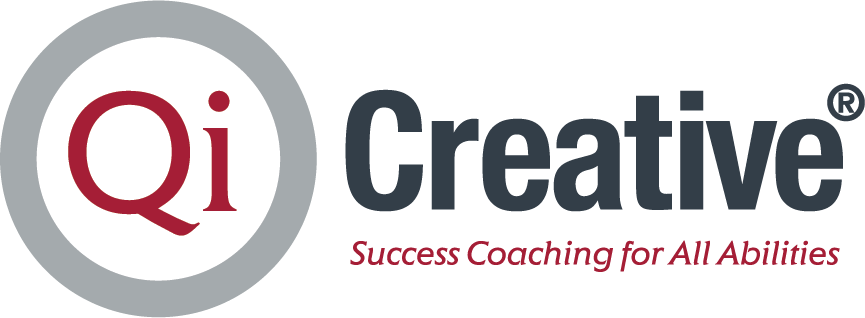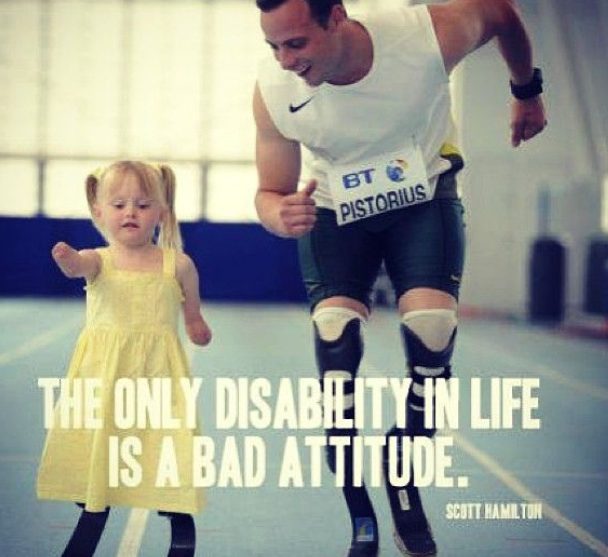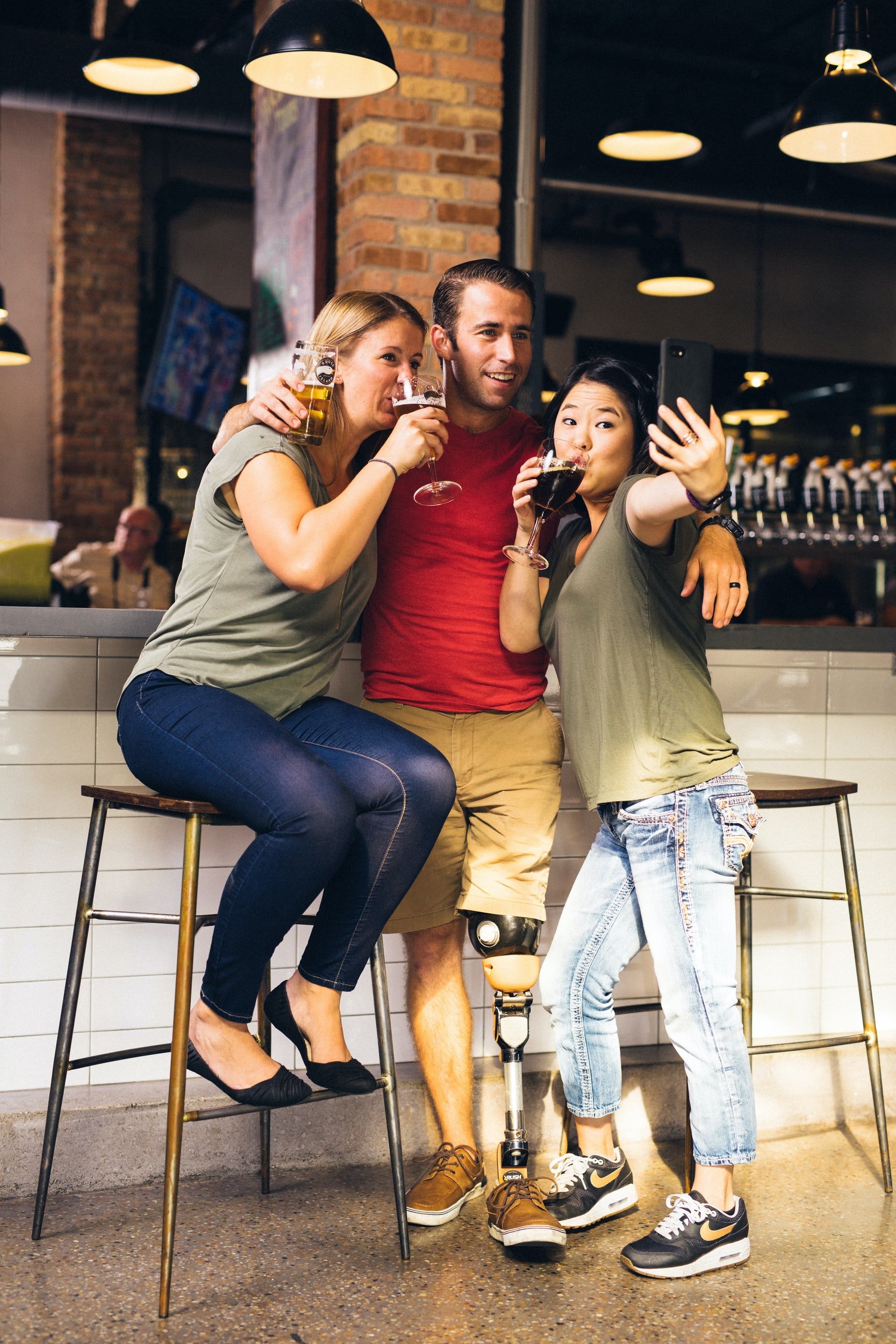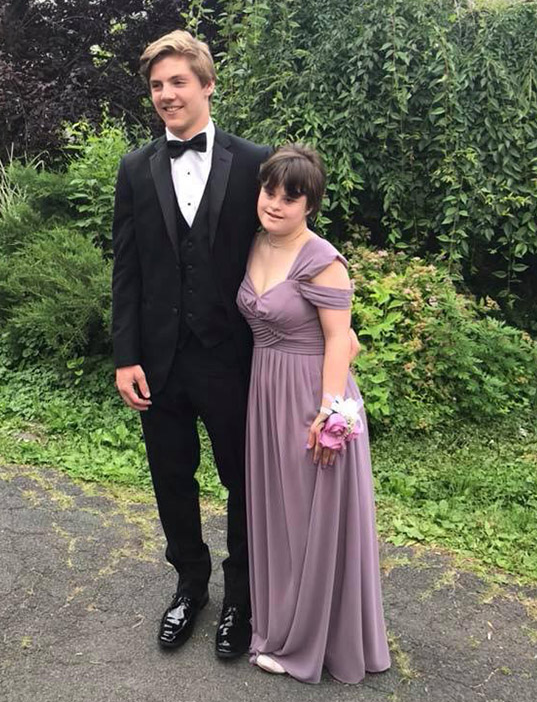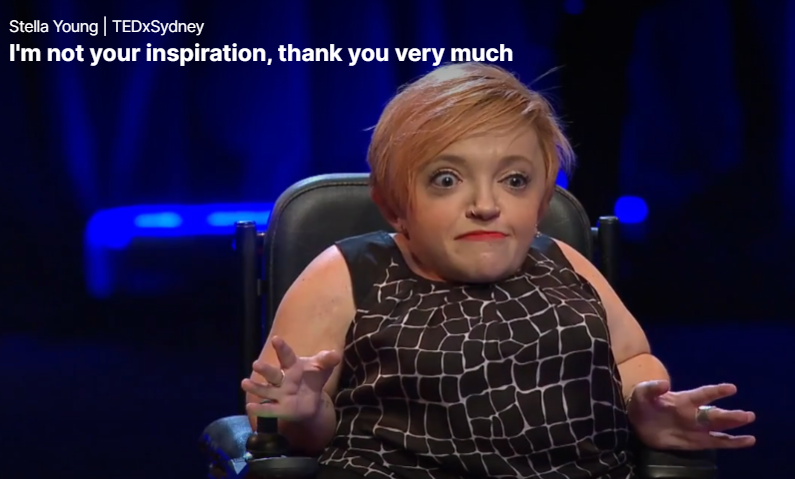What is Inspiration Porn?
Image description: An athlete and a young child, both with leg prosthesis, walk forward together with the quote “the only disability in life is a bad attitude.”
Perhaps you’ve been scrolling on social media when you come across a short article or video about a how a disabled teenager was invited to prom, how ‘bravely’ a disabled person participated in a sport or a job, or how a group of friends got together to do something charitable for a disabled person.
Depictions like these are called “Inspiration Porn,” meant to use disabled people to make able-bodied people feel good, or reduce disabled people into objects of inspiration.
In their shortest form, they might appear as memes of a disabled person doing an activity with some inspirational quote, or asking “what’s your excuse?” -- an implied “If this person can do it, what’s your excuse for not being able to do it too?”
These articles, videos, and memes can mean well, but have negative effects unforeseen by their creators.
Who is Inspiration Porn for?
Image description: A group of friends take a selfie in a bar. | Unsplash
Inspiration Porn can be created with a variety of intentions and messages—but more often than not, using disabled people as props to carry a a message rather than respecting their individual humanity.
Content like Inspiration Porn is generally targeted toward able-bodied people, implying if a disabled person can do something, able-bodied people should be able to do the same, or more.
Inspiration Porn can also downplay or hide various bodymind experiences of disabled people who, like the image at the very top of this blog, are lacking a proper ‘attitude’ to navigating their disability.
The news article featuring this image was entitled “Football Star Takes Girl With Down Syndrome To Prom”, centering the charity of one and the pity of another.
Inspiration Porn can target disabled people who are not attaining various imposed measures of success and failure, or not able to access the assistance of able-bodied people (or be a source of ‘feel-good’ for the able-bodied person who is assisting the disabled person).
Longer pieces of Inspiration Porn subtly or not-so-subtly emphasize and praise the abled people who pushed for the achievement, or focus on the charity of the abled people in question.
This viral video of a group carrying their disabled friend on a hike up a mountain is another example -- this is structured as a news story about how kind the friends were. This article, while naming the disabled person, also describes him as a “paralyzed pal” to the friends who assisted him.
Inspiration Porn often ignores institutional barriers to access, and implies that because one person was able to "overcome" their disability or be graciously assisted by an able-bodied person or people, anyone should be able to do the same.
These posts trade on pity for disabled people, not empowerment, often openly infantilizing them by praising them in the same language one might use for a child, rather than an adult trying to live their lives.
“The biggest problem with disability is how we treat those with disabilities.”
Not Your Inspiration or Pity
Before you see another ‘disabled success story’—ask yourself—who is sharing the story, and why is the story being shared in the first place?
When a ‘feel good’ story about a disabled person is shared, what exactly are you ‘feeling good’ about? Yourself—or them?
In writing this blog, we invite you to think about the ‘intended’ feelings that Inspiration Porn tries to elicit: pity, pride, congratulations, inspiration—but is this because of who disabled people are, or in spite of who they are?
The ‘pride’ and ‘inspiration’ that comes from Inspiration Porn is often drawn from a foundation that expects disabled people to be unsuccessful, unhappy, dependent—with Inspiration Porn trying to show brief moments of breaking out of the bounds of this foundation of attitudes, stereotypes, and beliefs.
Harmful Stereotypes and Tropes
Me Before You (2016) used the marketing hashtag #LiveBoldly, but the film’s plot is wrought with ableist themes—not to mention the disabled character is portrayed by a non-disabled actor.
There are many different stereotypes and tropes that can fall under Inspiration Porn. Here are a few examples:
A disabled person is congratulated or framed as inspiring for their employment, travel, relationships, and other experiences of everyday living
A disabled person is being cheered on/guided by able-bodied athletes for completing an athletic activity
Moreover, disabled people being assisted in tasks such as eating at a restaurant, focusing on the ‘kindness’ of the assistant
A disabled person being invited to social events out of charity/pity (eg. Prom queen and king)
A disabled person removes themselves from society for the benefit of able-bodied people and spaces (see Me Before You example)
A disabled person is documented as ‘overcoming’ institutional barriers and graduates from high school/medical school etc, when such barriers should have been removed or accommodated from the outset (or the focus is on family members, partners or friends who ‘sacrificed’ to help them graduate)
Depictions of disabled people are by those who are constantly positive/happy or conventionally attractive (or in egregious examples, are actors and models who are not disabled, and instead portray disability they do not have)
In the movie Me Before You (2016), a wheelchair user finds his life so intolerable that he undergoes assisted suicide, partially in order to give his love interest enough money for recreational travel -- a particularly bad example of a trope that sacrifices disabled people and casts it as their own decision. Me Before You uses the protagonist’s assisted suicide to tell his love interest to “live a full life instead of half a life with him”.
Tropes such as these are prime examples of Ableism, discussed in our Disability Pride Month blog post.
Celebrating Success, Pride and Joy
Image description: A man poses for a picture with a young boy, thumbs-up in celebration.
Since our founding in the late 2000s, Qi Creative has carried the tagline “Create YouR Awesome”, with the capitalized R to communicate that “you are awesome”.
Our emphasis is that Life is Worth Celebrating—it is positive, powerful, and not for pity.
On the occasion that we share videos, images and other depictions, we strive to show genuine aspirations of disabled people -- often the everyday challenges and goals of living. We celebrate successes, achievements, and happiness, not because they are lessons but because those things are worth celebrating.
We hope this article was an interesting introduction to Inspiration Porn, and the ways it can be seen in the media landscape around you.
More Information:
Unpacking Disability with Meriah Nichols - What is Inspiration Porn? (Includes more image samples of Inspiration Porn as well as positive samples of depicting disabled people)
Stella Young - I’m not your inspiration, thank you very much
Washington Post - My disabled daughter isn’t your inspiration porn
